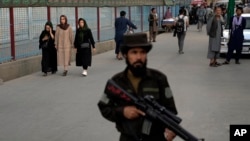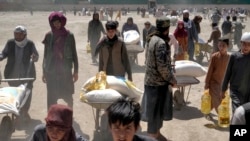A year after their forces swept through Afghanistan and surged to power, the Taliban still struggle to gain international recognition, even though several countries have engaged with the group in one way or another, especially to respond to an unfolding humanitarian crisis there.
Most recently, Afghanistan made headlines with the U.S. killing of al-Qaida leader Ayman al-Zawahiri in Kabul’s residential district, complicating Taliban efforts for recognition.
The Taliban said they were not aware that al-Zawahiri was in Afghanistan.
They said the strike violated both international laws and last year’s deal with the United States on the withdrawal of U.S. troops. The Doha Agreement signed in Qatar in February 2020 also called on the Taliban, the then-insurgent group, to keep transnational terrorists from operating in Afghanistan. The U.S. blamed the Taliban for violating the agreement.
“By hosting and sheltering the leader of al-Qaida in Kabul, the Taliban grossly violated the Doha Agreement and repeated assurances to the world that they would not allow Afghan territory to be used by terrorists to threaten the security of other countries,” U.S. Secretary of State Antony Blinken said in a statement on August 1. “They also betrayed the Afghan people and their own stated desire for recognition from and normalization with the international community.”
To date, no country has officially recognized the Taliban government in Afghanistan. Nowadays, however, the Taliban can count on a warmer reception in China, Russia and other countries that are on adversarial terms with the West.
Following months of overtures that included handing over the Afghan embassy in Moscow to Taliban representatives as recently as June, Russia hinted at the possibility of formal recognition.
“There is such a possibility,” Zamir Kabulov, Russia's special envoy in Afghanistan, told Russian state television Channel One Russia. “Its conditions were determined by both the Russian president and foreign minister." Kabulov further specified the formation of an “inclusive ethnopolitical government” as the first step required to be taken by the Taliban.
Similarly, China has allowed the Taliban to assume control of the Afghan embassy in Beijing. Furthermore, the Chinese have signaled interest in numerous economic initiatives regarding Taliban-ruled Afghanistan, most notably, financial support for the construction of a transnational railway across Afghanistan that would connect Uzbekistan to seaports in Pakistan.
"China has active diplomacy with the Taliban and has announced a number of initiatives and interests for a post-U.S. Afghanistan," Kabir Taneja, a fellow with the Strategic Studies program at the Observer Research Foundation in New Delhi, told VOA. "So there is a significant amount of posturing by Beijing, but not enough movement yet. I don't think … Beijing wants to be in a position where it is seen as mothering the Taliban regime both economically and politically."
The overtures come as China grapples with criticism of its treatment of its Muslim Uyghur minority and others in Xinjiang province. The United States, along with some other Western governments and rights groups, accuses Beijing of genocide and crimes against humanity against Uyghurs, Kazakhs and other Muslim minorities in Xinjiang. China has repeatedly denied the accusations.
Experts say Pakistan also is trying to establish a relationship with the Taliban because of cascading security challenges.
Last year, the Pakistani political and security establishment appeared to openly back the Taliban as then-Prime Minister Imran Khan characterized the insurgent group’s return to power as breaking the “shackles of slavery.” Yet the initial sense of jubilation dissipated with the recognition of the dangers posed by the Pakistani Taliban, Tehreek-e-Taliban Pakistan, or TTP.
“It became obvious very early on that the Taliban's ideological, organizational, tribal, and personal ties with the TTP, its fellow ideological traveler, would trump any feeling of gratitude it had toward Pakistan for supporting it — diplomatically, militarily, and institutionally — for the last 20 years,” said Claude Rakisits, a senior strategic analyst at the Australian National University. He said the security situation along the Pakistan-Afghanistan border is worse than before.
Iran, meanwhile, has kept a relative distance from its eastern neighbor, exhibiting greater ambiguity toward the Taliban. Initial concerns emanating from clashes along the border between the Taliban and Iranian border guards have given way to a modus vivendi that appears to be based on mutually recognized interests. Led by Shia clerics, Iran ascribes to a brand of Islamic ideology that differs from the one embraced by the Sunni Taliban.
Meanwhile, Turkey, which has a majority Muslim population, maintains an embassy in Kabul, but the Taliban have no diplomatic presence in Turkey. Ankara, though, remains involved in economic projects in Afghanistan.
Turkey’s ambassador, Cihad Erginay, joined senior Taliban representatives to attend the recent completion by a Turkish construction company of the second phase of the Kajaki hydroelectric dam in Helmand province at a cost of about $160 million. In addition, Turkey is seeking stability in Afghanistan to stem the flow of Afghans entering Turkey via Iran.
In recent months, Turkish officials say more than 18,000 Afghans have been deported from Turkey.
The United Nations estimates that more than half of Afghanistan’s estimated 40 million population are suffering from acute hunger and urgently need humanitarian aid. Some 1.1 million Afghan children are suffering from malnutrition.
The already bad humanitarian crisis in Afghanistan worsened following the return of the Taliban to power a year ago this month in the wake of international financial sanctions on the group, pushing the national economy to the brink of collapse.
Ayaz Gul in Islamabad and Akmal Dawi contributed to this report.







